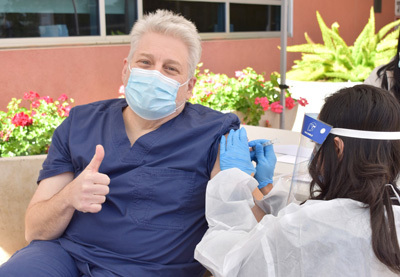RX for Success: How the Los Angeles Jewish Home Pharmacy Advances Education and Boosts Resident Care


RX for Success: How the Los Angeles Jewish Home Pharmacy Advances Education and Boosts Resident Care

As senior residential care facilities nationwide have adapted and developed emergency protocols for administering the coronavirus vaccine, the Los Angeles Jewish Home has been at the forefront. Its secret weapon: an on-site pharmacy in one of its buildings, with a clinical pharmacy residency program that enables the Jewish Home to acquire, dispense, and monitor medications effectively and efficiently for the residents of that building. During the pandemic, the existence of this program has resulted in an organized vaccine clinic, allowing more people to get immunized, at a faster rate, than at many other senior care homes across California and around the country.
"It's unusual for an organization like ours to have in-house pharmacists, but I believe it's the future for all long-term care facilities," says Noah Marco, MD, chief medical officer at the Jewish Home. "Among the many things doctors at a place like the Jewish Home do in caring for patients is prescribing needed medications, and as a physician I think there's no better resource than having a pharmacist stand shoulder-to-shoulder with you to improve care."
Having an established pharmacy gave the Jewish Home an important advantage when it came time to getting the COVID-19 vaccine. "We were well positioned because we have essential equipment like medication refrigeration for the vaccine, and we also meet all the compliance requirements for pharmacies, which means we're able to handle and distribute the medication in the proper way," Dr. Marco says. "Many other facilities that had not invested in that process are currently struggling."
The benefits go well beyond COVID-19, notes Aida Oganesyan, PharmD, the Jewish Home's director of pharmacy services. "The pharmacists are a timely resource for our clinicians where time is often of the essence," she says. "Since caring for Jewish Home residents is our full-time job, we can rapidly and proactively communicate important information when the prescriber and patient need it."
Based at the Jewish Home's Joyce Eisenberg-Keefer Medical Center, Dr. Oganesyan serves the entire organization, across multiple campuses. She got her start at the Home eight years ago, fresh out of pharmacy school.
"I was the Jewish Home's first pharmacy resident, in 2013-14," she recalls. "Geriatrics had always been of interest to me, and when I heard about the program at the Home, I was immediately excited to learn more. As it turns out, I loved it so much, I decided to never leave!"
The pharmacy residency program is a joint effort of the Jewish Home and Western University of Health Sciences (WesternU) College of Pharmacy, located in Pomona. Each year, the program accepts one resident—a recent pharmacy school graduate—who spends 12 months at the Jewish Home gaining critical hands-on experience. WesternU also sends its current pharmacy students to the Jewish Home for six-week clinical rotations during the academic year. The program is run by Janice Hoffman, PharmD, who splits her time between WesternU and the Jewish Home.
Dr. Hoffman says the Jewish Home has been an ideal site for this accredited residency program. "The Home is a special place. You feel part of the family here. And everybody wants to do what's best for the patient, regardless of what that requires. It's not stagnant, everyone is willing to try new ways, and there is a willingness to listen and adapt."
Since the program launched in 2013, the clinical services that pharmacy residents provide at the Jewish Home have continued to grow exponentially. "In the beginning, we were just working with the Auerbach Geriatric Psychiatry Unit (AGPU). Then we created an antibiotic stewardship program for our Joyce Eisenberg-Keefer (JEK) Medical Center residents. Our first project outside of the JEK building was an anticoagulation monitoring program that was developed for all Jewish Home nursing residents. After that, we pioneered a program wherein residents who experience a fall get a comprehensive medication evaluation by our pharmacists. Our current fellow, Rachel Stone, is running our new hypertension medication management program, which we're piloting in JEK to try to reduce the number of medicines seniors take and the number of times they have their blood pressure taken daily and weekly. Most people do not need to have their blood pressure measured as often as it typically is; perhaps once daily or weekly may be enough," Dr. Hoffman says.
For Dr. Stone, who graduated with a PharmD from the Thomas J. Long School of Pharmacy at the University of Pacific in May 2020, being at the Jewish Home is an opportunity to develop her knowledge of geriatric psychiatry, which she plans to make her career specialty. "At AGPU, I'm able to participate in interdisciplinary team rounds with psychiatrists, nurses, social workers, activities coordinators and dieticians. It's great because I get to contribute my recommendations from a pharmacy perspective as I'm learning about the whole continuum of care," she says.
She is also a central part of the Jewish Home's vaccination effort, supervising the pharmacy interns from WesternU and leveraging her expertise to help immunize residents and staff. "I always feel great when someone tells me they didn't feel anything after getting the COVID shot—it means I've done my best with my technique to make sure people don't get hurt!" she says.
Dr. Stone administered the second dose of the vaccine to Dr. Marco. "While she was preparing the shot, I was reflecting on how unique the Jewish Home is," Dr. Marco says. "Through our fellowship and pharmacy, we're simultaneously able to help train up-and-coming professionals and to benefit our residents with access to a fully licensed pharmacist. As far as I'm concerned, it's just another reason the Jewish Home stands heads and shoulders above the rest!"